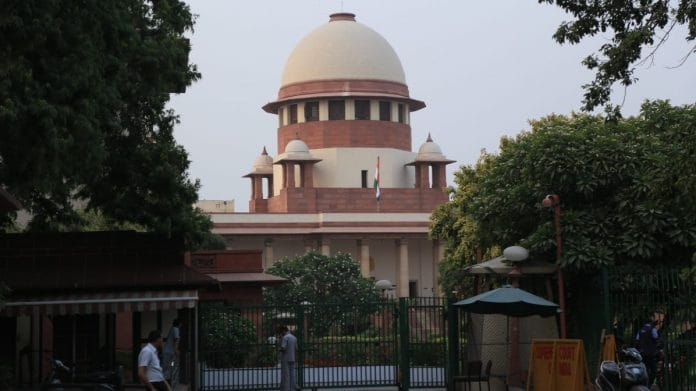New Delhi: The Supreme Court collegium Thursday sent two names to the Modi government for elevation as judges of the top court, including a high court judge who could end up as the second Dalit Chief Justice of India in 2025.
Two other names were reiterated.
The collegium decided to recommend Justice Bhushan Ramkrishna Gavai of the Bombay High Court and Himachal Pradesh Chief Justice Surya Kant for elevation to the top court at a meeting Wednesday night.
Both of them will be in line to become CJI if the recommendations are accepted by the Modi government.
ThePrint was the first to report about the possibility of the duo’s nomination this January.
If the Centre clears Justice Gavai’s appointment, he will be the first Dalit judge in India’s top court since CJI K.G. Balakrishnan’s retirement on 11 May 2010. He will then be in line to take oath of office as CJI on 13 May 2025, 15 years after Balakrishnan demitted office as India’s first Dalit CJI.
Kant will take over as the top judge when Gavai retires.
The recommendations follow requests made by the Narendra Modi government to Chief Justice of India Ranjan Gogoi, who heads the collegium, to bring more members of society’s marginalised sections to the higher judiciary, a cause also taken up by previous governments.
The collegium Thursday also reiterated its recommendation to elevate Jharkhand High Court Chief Justice Aniruddha Bose and his Gauhati High Court counterpart A.S. Bopanna. Their names had been sent back by the Centre after the collegium first forwarded them last month.
Also read: Row over collegium picks for Supreme Court escalates but govt appoints them
Seniority and representation of marginalised
In recommending Gavai, the collegium, which comprised the five most senior judges of the top court, acknowledged that his seniority stands at serial number 8 among India’s high court judges, but pointed out that India’s top court had not had a Dalit judge in a decade.
The collegium resolution, which is available on the SC website, read: “His recommendation, in no way, is to be misconstrued to mean that three senior-most judges from Bombay High Court (two of whom are serving as Chief Justices) are less suitable than Mr Justice Gavai.”
“On his appointment, the Supreme Court Bench will have a judge belonging to Scheduled Caste category after about a decade,” the collegium’s resolution added.
Surya Kant, who stands at serial number 11, will give due representation to the Punjab and Haryana High Court, his parent high court, which accounts for just one Supreme Court judge now.
There are currently 27 judges in the Supreme Court, which has a sanctioned strength of 31. If all the four recommendations are cleared, the court will have full strength.
The two judges
Justice Gavai courted headlines two years ago as a witness to the death of CBI judge B.H. Loya, who reportedly died of a heart attack while attending a wedding in Nagpur in 2014. At the time of his death, judge Loya was hearing the CBI’s case against BJP president Amit Shah, with regard to the alleged fake encounter of Sohrabuddin Sheikh.
Also read: If collegium has its way, India could soon get its second Dalit CJI
Shah has since been discharged in the case.
When judge Loya’s family reportedly raised questions about the circumstances surrounding his death, Justice Gavai, who was at the wedding too, dismissed the allegations.
As for Justice Surya Kant, the government had taken a lot of time to clear the collegium’s recommendation to elevate him as Himachal Pradesh High Court Chief Justice in October last year. According to sources, among other things, the government wanted to look into the contents of a note and accompanying complaint sent by one of the consultee judges, the current National Green Tribunal chairperson Adarsh Kumar Goel, but the claims were subsequently found baseless, a source had told ThePrint in January.







One of the last important judgments delivered by CJI K G Balakrishnan, on the eve of his retirement, having been reserved for orders for several months, pertained to the K G Basin.